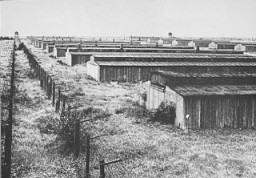You searched for: Warsaw ghetto
<< Previous | Displaying results 291-300 of 344 for "Warsaw ghetto" | Next >>
-
William (Bill) Lowenberg describes the importance of bonds of friendship among young people imprisoned in the Westerbork camp
Oral HistoryAs a boy, Bill attended school in Burgsteinfurt, a German town near the Dutch border. After the Nazis came to power in Germany in January 1933, Bill experienced increasing antisemitism and was once attacked on his way to Hebrew school by a boy who threw a knife at him. In 1936, he and his family left Germany for the Netherlands, where they had relatives and thought they would be safe. However, after Germany invaded the Netherlands in May 1940, antisemitic legislation--including the order to wear the Jewish…
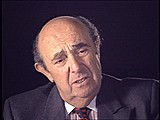
-
William (Bill) Lowenberg describes Zionist and cultural activities in the Westerbork camp
Oral HistoryAs a boy, Bill attended school in Burgsteinfurt, a German town near the Dutch border. After the Nazis came to power in Germany in January 1933, Bill experienced increasing antisemitism and was once attacked on his way to Hebrew school by a boy who threw a knife at him. In 1936, he and his family left Germany for the Netherlands, where they had relatives and thought they would be safe. However, after Germany invaded the Netherlands in May 1940, antisemitic legislation--including the order to wear the Jewish…
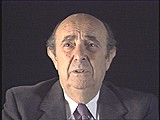
-
Combating Holocaust Denial: Evidence of the Holocaust presented at Nuremberg
ArticleAt the Nuremberg trials, Allied prosecutors submitted documentation left by the Nazi state itself. This evidence is a lasting refutation of attempts to deny the Holocaust.

-
Elzbieta Lusthaus
ID CardElzbieta grew up in Iwonicz, a resort town in southwestern Poland noted for its mineral water. Her father, Edmund, was a respected physician and Helena, her mother, had studied pharmacology. At home, they spoke Polish and were among the few Jewish families who lived in Iwonicz. 1933–39: When German troops invaded Poland on September 1, 1939, Elzbieta's father was drafted into the Polish army. Seventeen days later, the Soviet army drove in from the east and Edmund was captured. He was transported to a…
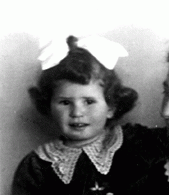
-
Herman Klein
ID CardHerman was the fourth of eight children born to a religious Jewish family in the small town of Sirma, located near the city of Sevlus. The Kleins had a small plot of land, which they farmed, and they also ran a shoe shop. At age four Herman began attending religious school. When he started public elementary school, he continued his religious lessons in the afternoons. 1933-39: In March 1939, the region of Czechoslovakia in which Herman lived was annexed to Hungary. His teacher at school was replaced by a…
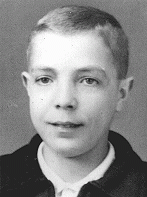
-
Abram Kisielnicki
ID CardThe oldest of three children, Abram was born to Jewish parents in the small, predominantly Jewish town of Kaluszyn, 35 miles east of Warsaw. Abram's father owned a wholesale grocery store, a restaurant and a gas station, all of which were located on the heavily traveled main road. Abram went to public elementary school and also received religious instruction. 1933-39: Abram was 21 when the Germans invaded Poland. Abram, his father, and his brother Majlech fled eastward towards the Soviet Union because…
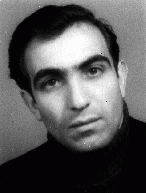
-
Jocheved Kuzda Kasher
ID CardJocheved, or Jadza as she was called at home, was born in the industrial city of Lodz, Poland's second-largest city. Before the war, one-third of Lodz's inhabitants were Jewish. The Kuzdas kept a traditional Jewish home and placed importance on their children's education. Jocheved had two older sisters, Sarah and Regina. 1933-39: Jocheved was 9 when the war broke out in September 1939. Instead of starting school, she stayed at home listening to the bombs exploding. Her father and sister tried to get to…
-
Boleslaw Brodecki describes hangings in a labor camp and their impact on the prisoners
Oral HistoryBoleslaw and his older sister were raised in a Jewish section of Warsaw. The Germans attacked Warsaw in September 1939. Boleslaw's father did not want to leave his ill relatives behind, so Boleslaw and his sister escaped on a train heading for the Soviet border. The Germans invaded Soviet territories in 1941, and in 1942 Boleslaw was imprisoned in a forced-labor camp. He was deported to the Theresienstadt ghetto, where he was liberated by Soviet forces in 1945.
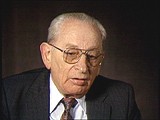
-
Blanka Rothschild describes returning to Lodz after the war to look for family members
Oral HistoryBlanka was an only child in a close-knit family in Lodz, Poland. Her father died in 1937. After the German invasion of Poland, Blanka and her mother remained in Lodz with Blanka's grandmother, who was unable to travel. Along with other relatives, they were forced into the Lodz ghetto in 1940. There, Blanka worked in a bakery. She and her mother later worked in a hospital in the Lodz ghetto, where they remained until late 1944 when they were deported to the Ravensbrueck camp in Germany. From Ravensbrueck,…
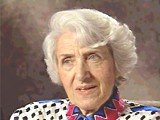
-
Lublin/Majdanek Concentration Camp: Administration
ArticleIn 1940, the Nazis established Lublin (Majdanek) concentration camp in Lublin, Poland. Learn more about camp administration.
